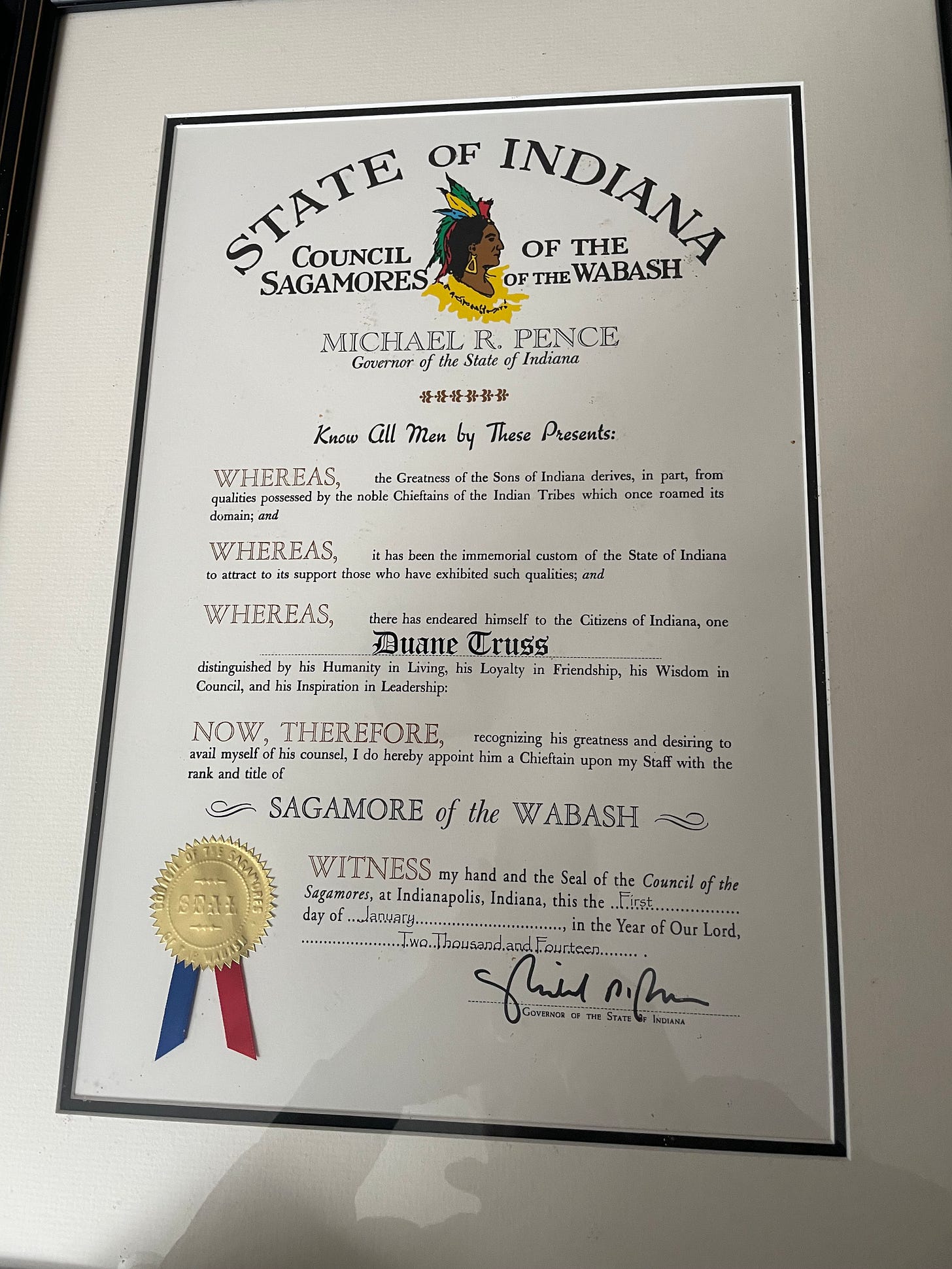I have some sad news. Duane Truss has died. Along with my brother Stan, and my cousin Tom Snyder, Duane and his wife Bonnie were essential voices for me in the story of the forced moving of graves to make way for the Upper Wabash Valley Flood Control Project reservoirs. One of them was my grandmother’s, that of Dad’s mom, Eva Arrick Shroyer. Duane was a member of the cemetery board that dealt with the 3,000 Mississinewa area excavations in 1966. I interviewed Duane and Bonnie in the warmth of the farmhouse they shared two miles north my dad’s boyhood home in November of 2022. When I told them that I wanted my grandson to know about my dad, they welcomed my conversation like they had been waiting for me to arrive, like I was coming in from a snowstorm. Duane and Bonnie were married for 67 years and had three sons. He was a lifelong Wabash County farmer, with some time away in the Army, a 4-H leader for 55 years, and he and Bonnie were foster parents for 20 years, for around 60 children. Duane received Indiana’s highest honor, The Sagamore of the Wabash, for his community service in 2014. The fact that he shared with me that fact a few hours into my visit was a highlight of that day; I’d earned the trust of someone who avoided rather than sought any kind of self-promotion. Humble and yet proud, just the best kind of a person, was my impression, is my impression, of Duane and of Bonnie, too. Like Dad.
Some of you are old enough to remember cigarette machines, handy devices for smokers that could be found at bowling alleys and restaurant lobbies, places convenient to teenagers who had only recently earned their driver licenses. A quarter and a dime.
It may have been Dick Gregory, in a book I read around that time, who said that his initiative was limited to something that reminded him of a cigarette machine. Only when one pack was released into the world could the next pack proceed. The notion stuck with me because I’m like that. One idea at a time.
Other than our grandson Vern, its intended target, I didn’t think too much about the audience for my book as I wrote it. Imagining what that would mean in the world beyond my desk was beyond me. One idea at a time.
I found a story I wanted to tell but I wasn’t thinking about it like a product I wanted to sell when I wrote it. Now I am. That’s why it’s taking longer than I thought it would. There’s a lot more in-between stuff that has to happen than I realized.
Writing it was great, transcendent, beyond time and space, five to ten hours a day, and the research and the interviews were the same way. In one of the earliest interviews, with Dave Compton, at his home in Huntington County, I remember being surprised as I got into my car to go that almost six hours had passed since I sat down at his kitchen table. It seemed like an hour-and-a-half. Talking to Bonnie and Duane was that way, too.
I’m looking forward to talking about the book when it come out. Other than bemoaning Trump, it seems like the book is the only thing I’ve wanted to talk about for the last four-and-a-half years. So that’ll be fun, even the part when I have to think about what a particular audience might like to hear. I want to share what I found out, about Dad, about the people, and about the process that made Somerset dispensable.
There were some things I wanted to say to Vern about Dad and there were some things I wanted to find out about, that led me to other things I wanted to find out about, that I wanted to share with the boy who has my dad’s name. That’s how it started only. I would not have pursued it with a publisher if I did not believe it is a story worth sharing.
Now, the book has a cover and a table of contents and other things that we all expect to see when we pick up a book that have nothing to do with my grandson. I could have taken it to Kinko’s in its earliest form and had it printed on both sides of the paper and bound and presented it to Vern on his fifteenth birthday. But I didn’t. It’s a weird dichotomy: while I was writing to an audience of Vern, I also convinced myself that I had a story that the world deserved to hear. Like crazy-ass, I-was-sent-to earth-to-deliver-this-message, convinced myself. So I am up to something. I am expecting people to give me money for the privilege of reading what I had do say. Later, this year.



